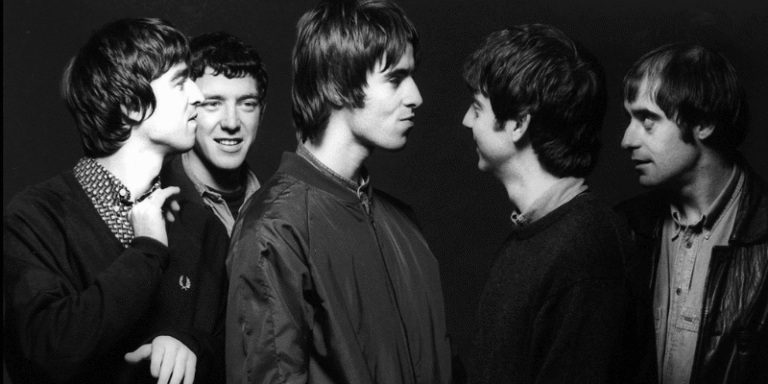In the mid-1990s, British music was undergoing a renaissance. Britpop — a cultural and musical movement celebrating distinctly British identity — dominated airwaves, music charts, and even political discourse. At the centre of it all stood Oasis, a Manchester-based rock band whose swaggering confidence, catchy melodies, and working-class authenticity made them one of the most iconic acts of their generation.
Formed in 1991, Oasis was fronted by brothers Liam Gallagher (vocals) and Noel Gallagher (lead guitar, main songwriter), alongside Paul “Bonehead” Arthurs (rhythm guitar), Paul “Guigsy” McGuigan (bass), and Tony McCarroll (drums). Their meteoric rise from Manchester pubs to headlining some of the biggest gigs in British history has been widely documented, yet the story of Oasis is not just one of fame, but of cultural significance and enduring influence.
From Manchester Streets to Global Stages
Oasis’s journey began in the working-class districts of Manchester, a city with a rich musical heritage — home to The Smiths, Joy Division, and The Stone Roses. The Gallaghers’ upbringing in the council estates shaped their no-nonsense, unapologetic image. According to Harris (2004), their appeal lay in projecting a rebellious authenticity that resonated with British youth in the wake of recession and social change.
The band’s debut album, Definitely Maybe (1994), was an instant sensation. Selling over 86,000 copies in its first week, it became the fastest-selling debut album in UK history at the time (BBC, 2019). Tracks like Live Forever, Supersonic, and Cigarettes & Alcohol captured a mixture of optimism and defiance. As Reynolds (2011) notes, the album revitalised guitar-driven rock in Britain at a time when grunge and electronic music were dominating.
(What’s the Story) Morning Glory? and Global Dominance
If Definitely Maybe put Oasis on the map, their second album (What’s the Story) Morning Glory? (1995) made them a global phenomenon. Featuring anthems such as Wonderwall, Don’t Look Back in Anger, and Champagne Supernova, the record has sold over 22 million copies worldwide (Britton, 2019).
At the height of their fame, Oasis represented more than just music; they became symbols of a new, confident Britain. Their famous rivalry with Blur — dubbed the “Battle of Britpop” by the press — became a media frenzy in 1995, culminating in both bands releasing singles on the same day. Blur’s Country House won the chart battle, but Oasis’s album ultimately outsold Blur’s The Great Escape by a wide margin (Harris, 2004).
The Britpop Cultural Moment
Britpop was not just a musical style but a cultural statement. Oasis, with their Beatles-inspired melodies, mod fashion, and working-class swagger, embodied the movement’s essence. Prime Minister Tony Blair famously invited Noel Gallagher to a Downing Street reception in 1997, cementing the band’s place in the national cultural narrative (Cloonan, 2007).
According to academic studies (Bennett & Stratton, 2010), Oasis’s music tapped into nostalgia for 1960s Britain while simultaneously appealing to 1990s youth who wanted to reclaim national identity from American pop culture. Their songs were singalong anthems that could fill stadiums but also deeply personal reflections of working-class pride.
Fame, Feuds, and Fallout
The Gallagher brothers’ volatile relationship became as famous as their music. Public spats, walkouts, and insults fuelled tabloid headlines for over a decade. While this drama sometimes overshadowed their artistry, it also enhanced their mythology.
Their 1997 third album Be Here Now was highly anticipated and initially broke sales records, but critics later viewed it as overblown and self-indulgent (Harris, 2004). Internal tensions, creative differences, and changes in band members gradually slowed their momentum.
By the mid-2000s, Oasis still enjoyed commercial success with albums like Don’t Believe the Truth (2005), but the cultural dominance they once held had faded. Finally, in 2009, Noel Gallagher quit the band after another argument with Liam, marking the end of Oasis as an active group.
Legacy and Influence
Even after their split, Oasis’s influence remains immense. Their songs continue to be played at football matches, pubs, and festivals across Britain. Younger bands — from Arctic Monkeys to Kasabian — have cited them as inspirations (Bennett, 2013).
Scholars have noted that Oasis’s impact went beyond music; they helped define what it meant to be British in the late 20th century, combining musical heritage with contemporary working-class narratives (Cloonan, 2007). Their records continue to sell, and Wonderwall has become one of the most streamed songs of the 1990s (Official Charts Company, 2021).
In 2016, the documentary Oasis: Supersonic offered fans an in-depth look at the band’s early years, cementing their story as a cornerstone of modern British popular culture.
Oasis were more than just a band; they were a cultural force that reshaped British music in the 1990s. Their rise from Manchester’s streets to global superstardom reflected the dreams and defiance of a generation. While internal conflicts ultimately tore them apart, their legacy endures in the hearts of millions and in the soundtrack of British life.
As Liam Gallagher once sang in Live Forever:
“Maybe I just want to fly / I want to live, I don’t want to die.”
That sentiment, bold and unapologetic, remains the spirit of Oasis — untamed, unforgettable, and uniquely British.
References
BBC (2019) Definitely Maybe at 25: How Oasis changed British music forever. BBC Culture. Available at: https://www.bbc.com/culture/article/20190828-definitely-maybe-at-25-how-oasis-changed-british-music-forever (Accessed: 2 August 2025).
Bennett, A. & Stratton, J. (2010) Britpop and the English Music Tradition. Farnham: Ashgate Publishing.
Bennett, A. (2013) Music, Style, and Aging: Growing Old Disgracefully? Philadelphia: Temple University Press.
Britton, L. (2019) ‘Oasis’ (What’s the Story) Morning Glory? turns 25’, NME. Available at: https://www.nme.com/features/oasis-whats-the-story-morning-glory-25th-anniversary-2760578 (Accessed: 2 August 2025).
Cloonan, M. (2007) Popular Music and the State in the UK. Farnham: Ashgate Publishing.
Harris, J. (2004) Britpop! Cool Britannia and the Spectacular Demise of English Rock. London: Da Capo Press.
Official Charts Company (2021) Most streamed songs of the 1990s. Available at: https://www.officialcharts.com/chart-news/most-streamed-songs-of-the-1990s__31250/ (Accessed: 2 August 2025).
Reynolds, S. (2011) Retromania: Pop Culture’s Addiction to Its Own Past. London: Faber & Faber.









